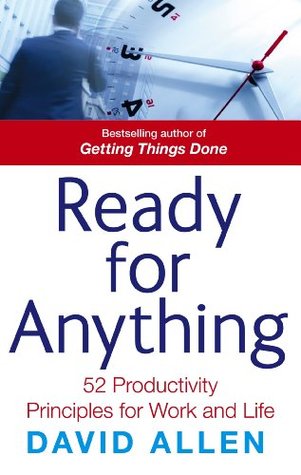More on this book
Community
Kindle Notes & Highlights
by
David Allen
Read between
September 7 - December 31, 2022
one’s ability to be productive was directly proportional to one’s ability to relax.
An old Asian proverb says, “The more you sweat in peace, the less you bleed in war.”
Stress comes from unkept agreements with yourself. You can relieve that stress only by canceling the agreement, keeping the agreement, or renegotiating it. But you can’t renegotiate agreements with yourself that you forgot you made. Because psychic RAM has no sense of past or future, things filed there push on you to be done all the time. They must be made conscious, and kept so, to alleviate the pressure.
Everything should be made as simple as possible, but not simpler. —ALBERT EINSTEIN
Concentration is the key to power, in physics and in life, and cooperation is the lubricant for the efficient flow of that energy.
Besides the noble art of getting things done, there is the noble art of leaving things undone. The wisdom of life consists in the elimination of nonessentials.
It’s possible to own too much. A man with one watch knows what time it is; a man with two watches is never quite sure. —LEE SEGALL
An hour of effective, precise, hard, disciplined, and integrated thinking can be worth a month of hard work.
You’ve got to think about big things while you’re doing small things so that all the small things go in the right direction. —ALVIN TOFFLER
This constant, unproductive preoccupation with all the things we have to do is the single largest consumer of time and energy. —KERRY GLEESON
The palest ink is clearer than the fondest memory.
The work will teach you how to do it. —ESTONIAN PROVERB
Rules tend to show up because principles are not clear or trusted. When you know that people have bought into standards, you can give them freedom for decisions and behaviors. If this alignment doesn’t exist, you must micromanage with regulations, expending much more energy in the long run.
We consistently challenge ourselves to play in the bigger game, In our day-to-day interactions, we are directed by curiosity instead of control, It is safe for all of us to explore, express, and move on. We support creative, conscious risk taking. We are respectfully nice.
What about the ability to … maintain relaxed control amid overwhelming amounts of incoming stuff, define doable projects from ambiguous direction, initiatives, and pressures, decide actions required when things show up versus when they blow up, regroup, recalibrate priorities, and regain balance rapidly with new information and changing circumstances, be alone, in cooperation with everyone else, renegotiate implicit and explicit agreements with themselves and others, express and consider any ideas, including bad ones, in front of their staff and then evaluate them objectively, refocus rapidly
...more
This responsibility for thinking through what one’s contribution should be and one’s own responsibility as a knowledge worker rests on each individual. In the knowledge organization it becomes everybody’s responsibility, regardless of his or her particular job. —PETER F. DRUCKER


